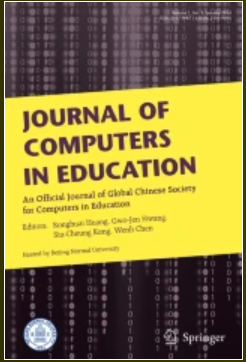Tensions between technology integration practices of teachers and ICT in education policy expectations: implications for change in teacher knowledge, beliefs and teaching practices
IF 4.3
Q1 EDUCATION & EDUCATIONAL RESEARCH
引用次数: 2
Abstract
Abstract In line with ICT in education policies and curricula in Ghana and many other countries, teachers are expected to integrate digital technologies into instruction to facilitate meaningful and engaging student learning experiences. More research is however needed to investigate teachers’ actual classroom practices with technology to determine whether these align with national ICT in education policies and curricula expectations. This qualitative study conducted phone interviews with twenty teachers from twelve schools and used a synthesised ICT pedagogy classification framework as a lens to investigate teachers’ technology integration practices in relation to Ghana's ICT policies and curricula requirements. Following a thematic analysis procedure, the article finds that teachers mainly use technology conveniently for lesson preparation and direct instruction delivery, treating technology primarily as a productivity tool to support traditional teacher-centred teaching tasks. The use of technology for constructivist practices and fostering student-centred learning appears to be limited, which contradicts the priorities outlined in ICT in education policies and curricula in Ghana. The findings highlight a discrepancy between the requirements of ICT policies and the actual classroom practices of teachers. The implications of the findings are discussed, emphasising the need to action change in teachers’ knowledge, beliefs, and teaching practices in order to bridge the gap and effectively translate ICT curricula and policy plans into actual teaching practices.教师的技术整合实践与教育政策期望中的ICT之间的紧张关系:对教师知识、信念和教学实践变化的影响
与加纳和许多其他国家的ICT教育政策和课程相一致,教师被期望将数字技术整合到教学中,以促进有意义和吸引学生的学习体验。然而,需要更多的研究来调查教师使用技术的实际课堂实践,以确定这些实践是否符合国家ICT教育政策和课程期望。这项定性研究对来自12所学校的20名教师进行了电话采访,并使用综合ICT教学法分类框架作为视角,调查教师在加纳ICT政策和课程要求方面的技术整合实践。根据专题分析程序,本文发现教师主要方便地使用技术来备课和直接教学,将技术主要视为一种生产力工具,以支持传统的以教师为中心的教学任务。将技术用于建构主义实践和促进以学生为中心的学习似乎是有限的,这与加纳教育政策和课程中信息和通信技术概述的优先事项相矛盾。研究结果强调了信息通信技术政策的要求与教师的实际课堂实践之间的差异。本文讨论了研究结果的含义,强调需要在教师的知识、信念和教学实践中采取行动,以弥合差距,并有效地将ICT课程和政策计划转化为实际的教学实践。
本文章由计算机程序翻译,如有差异,请以英文原文为准。
求助全文
约1分钟内获得全文
求助全文
来源期刊

Journal of Computers in Education
EDUCATION & EDUCATIONAL RESEARCH-
CiteScore
14.50
自引率
1.60%
发文量
37
期刊介绍:
JCE is an interdisciplinary forum for communication of perspectives among researchers, practitioner, and policy makers on theories and practices in technology enhanced learning. The journal aims at making an impact on educational practices and thus to transform learning. The journal publishes up-to-date research and experiences in information communication technologies (ICT) in learning and education. Authors are encouraged to submit papers related, but not limited, to the following topics of interest:1. Hotspots and Frontiers – reporting on current research and policy initiatives as well as national or international key research projects in the field ICT in education. 2. Instruction and Design - theoretical and methodological issues related to instructional design, curriculum development, and the role of technology in instructional transformation, particularly issues from social, cultural, psychological, cognitive, and pedagogical perspectives. 3. Learning and Technology - issues of learning technologies from theoretical and pedagogical perspectives. Specifically, it covers ubiquitous learning, human intelligence as well as other emerging technologies in education. 4. Media and Tools - patterns of educational communications and state-of-the-art educational media as well as instructional tools, which encompass learning management systems, interactive learning systems, knowledge visual tools, thinking training tools, as well as educational virtual reality systems and educational games.5. Academic Reviews - reviews on important works and publications in the field of ICT in education.
 求助内容:
求助内容: 应助结果提醒方式:
应助结果提醒方式:


